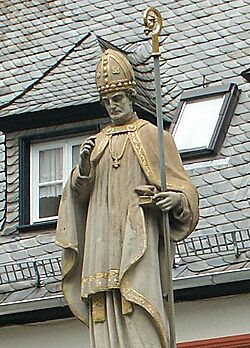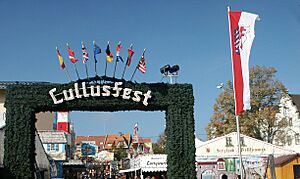Lullus facts for kids
Quick facts for kids Saint Lullus |
|
|---|---|

Statue of Saint Lullus in Bad Hersfeld
|
|
| Bishop | |
| Born | c. 710 Wessex |
| Died | 16 October, 786 Hersfeld Abbey |
| Venerated in | Orthodox Church Roman Catholic Church |
| Canonized | 7 April 852 |
| Feast | 1 June |
Saint Lullus (also known as Lull or Lul) was an important church leader. He was born around 710 AD in Wessex, England. He passed away on October 16, 786, in Bad Hersfeld, Germany. Lullus became the first official archbishop of Mainz. He took over from Saint Boniface. He was also the first abbot (leader) of the Benedictine Hersfeld Abbey. He is seen as the first ruler of the Electorate of Mainz, a powerful church state.
Contents
Early Life and Becoming a Monk
Lullus was born in Wessex, England, around 710 AD. He joined the Benedictine monastery of Malmesbury Abbey in Wiltshire. There, he became a monk.
In 737, Lullus went on a special trip, called a pilgrimage, to Rome. While there, he met Saint Boniface. Boniface was a famous missionary who worked to spread Christianity in northern Germany. Lullus decided to join him.
In 738, Lullus moved to the Benedictine monastery of Fritzlar. This monastery was founded by Boniface in 732. Lullus's teacher there was Abbot Saint Wigbert, who also came from England.
Working with Saint Boniface
In 741, a powerful ruler named Charles Martel died. This marked the start of a very important time for Saint Boniface. Lullus became Boniface's closest helper during this period.
We know a lot about Lullus from letters written by Saint Boniface. These letters show that Lullus was a deacon (a church official) by 745-746. He was Boniface's archdeacon (a senior church official) by 746-747. He became a priest by 751.
Boniface trusted Lullus a lot. Lullus often carried important messages for Boniface. He even traveled to Rome twice on Boniface's behalf. He also helped with secret talks about who would take over as archbishop in Mainz. Lullus was the youngest of Boniface's helpers. He became his most trusted friend and assistant.
Becoming Archbishop of Mainz
In 753, King Pippin confirmed Lullus as the bishop of Mainz. A bishop is a high-ranking church leader.
In 754, Saint Boniface decided to step down. He chose Lullus to be his successor. This made Lullus the archbishop of Mainz. An archbishop leads a larger group of bishops.
Lullus became the first official archbishop of Mainz. This happened around 781. At that time, Pope Hadrian I gave him a special scarf called a pallium. This scarf showed his important role. Lullus then made his bishopric (the area he oversaw) much larger. He added the areas of Büraburg (near Fritzlar) and Erfurt.
Building Hersfeld Abbey
From 769 onwards, Lullus worked hard to build the Hersfeld Abbey. This monastery was built in the Carolingian style. The Carolingian style was popular during the time of Charlemagne.
In 775, Lullus successfully placed Hersfeld Abbey under the protection of Charlemagne. Charlemagne was a very powerful emperor. This protection helped the abbey grow and become strong.
Lullus's Achievements
Lullus's main achievement was finishing the church reforms started by Saint Boniface. These reforms helped organize the church in the Frankish Carolingian Empire. He also successfully helped spread Christianity in the German regions of Hesse and Thuringia.
Saint Boniface wanted a very close connection with Rome. However, Lullus tried to have a better relationship with the Frankish kings. He believed this would help the church more.
Lullus passed away on October 16, 786. He died at Hersfeld Abbey in Bad Hersfeld. He is buried in the church there.
Honoring Saint Lullus
Lullus was officially recognized as a saint on April 7, 852. This process is called canonization.
A book called the Vita Lulli was written about Lullus's life. It was written by Lampert of Hersfeld. This book helped people to honor Lullus as a saint. He became a main patron (protector) of Hersfeld Abbey, along with Wigbert.
The Lullusfest is a very old folk festival in Germany. In 2012, it celebrated its 1,160th birthday! This festival celebrates the founding of the city of Bad Hersfeld. The city was founded over 1,275 years ago. People there still remember and honor Saint Lullus. He left England in the 730s to help spread Christianity to the German tribes.
See also
- List of Carolingian monasteries
- Carolingian Renaissance


